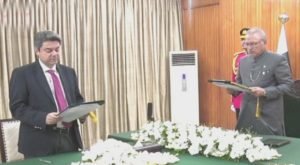ISLAMABAD: Prime Minister Imran Khan alluding to the issue of unprecedented population growth maintained that it was inextricably linked to the environmental hazards, food security and loss of greenery.
The recent Paris conference on the environment had set the alarming bells ringing for the third world countries, especially Pakistan which had been severely affected with the global warming and currently ranked as the seventh most affected country in the world, he added.
He recollected memories of his childhood and youth, saying how the Lahore city appeared in the past and now the city was fast turning into an abode of concrete and metal structures, whereas the River Ravi had been made a sewage dump.
The Gilgit Baltistan used to offer lush green forests with fruit-bearing trees, but now the every growing population was inhibiting the inaccessible areas of the country, he observed.
The prime minister stressed that such issues should be taught at the school levels.
The conference was organized by the Law and Justice Commission in collaboration with the Ministry of Health Services. Chief Justice of Pakistan Mian Saqib Nisar, justices of the superior judiciary, chief ministers, AJK prime minister, federal ministers, officials, academia, foreign diplomats, delegates, legal fraternity, and media persons were present on the occasion.
The prime minister said his government was concentrating on some of the urgent issues confronted by the country, including the economy. All the provincial governments were on board over the population issue as the task forces had been set up.
He said the issue required a determination as it was halfheartedly tackled by the previous regimes. “The issue can be effectively addressed if all the stakeholders own it,” he emphasized and cited examples of Bangladesh and Iran where the role of Ulema through mosques was utilized.
Prime Minister Imran Khan said now the world was passing through a digitalized revolution in which the public could be kept well informed through the dissemination of vital information on the issues.
He underlined the importance of prime-time TV programmes to highlight such issues.
The prime minister said the PTI government had successfully carried out the plantation drive in Khyber Pakhtunkhwa, which was later joined by all the residents as they had realized its importance.
He expressed the confidence that about 10 billion plants would be planted all over the country.
The prime minister also acknowledged that the legislation was required to do away with the colonial era legal frameworks like CPC and CrPC. His government within the first one hundred days had done work in that regard and would soon introduce at least six legal amendments in the parliament over CPC and CrPC, he added.
He stressed for revamping of the outdated and obsolete legal provisions and laws.
The prime minister on behalf of the whole nation also appreciated the Chief Justice of Pakistan for taking up such human rights issues.
He said the Panama Papers case verdict had set the new direction of rule of law in the country as it made a sitting prime minister accountable for the first in the country’s history.
He said for the first time, the Capital Development Authority, was proceeding with the issue of regularization of his residence under the direction of the Supreme Court. “Imagining such thing in the past was impossible,” he added.
The prime minister said the Panama case also educated him over various other issues, including the reluctance of the accountability watch-dog institutions to proceed against the sitting premier.
He expressed his satisfaction that the state institutions were now becoming autonomous and working within their legal parameters.
The prime minister also struck a note of optimism that the country would soon move past the current financial and economic issues as it was immensely gifted with vast potentials.
The foreign investors were eager to invest in Pakistan despite knowing the current difficult phase through which the country had been passing, he added.
Describing “rule of law” as the foundation of a civilized society to move forward and achieve development, Prime Minister Imran Khan Wednesday said democracy and rule of law move in tandem.
Speaking at a national symposium titled “Alarming growth in population” in Pakistan, he hailed the Supreme Court decision in Panama Papers case as “a landmark judgment” which he said laid the foundation of Naya Pakistan.
He mentioned the democratic history of the world from the Greeks to Roman Empire and referred to the Riasat-e-Madina, which his government was trying to establish, showed rule of law as the foundation, adding, two of the caliphs had appeared in Qazi’s court.
The prime minister regretted that rule of law in Pakistan could not be ensured in the past as dictators had been trying to become democrats while democratic leaders became dictators.
He said the current period was the start of the best era in which the judiciary was taking up the matters of water scarcity, population control and others which the democratic government should have done.
He said it was unfortunate that the democratic governments with their short-term thinking only thought about five years so that they could win the election after their tenures.
The establishment of furnace-oil based power generation plants in the country was an example of such short-term thinking, he added.
The prime minister recalled that the construction of Mangla and Tarbela dams during the government of Ayub Khan were good examples of long-term planning, adding, with the good education system, effective bureaucracy, the country was moving ahead in the 60s decade.
He recalled that “Kam Bachay Khushhal Ghanara” was a good campaign on population control.
Chief Justice of Pakistan Mian Saqib Nisar in his speech maintained that the unchecked population growth entailed disastrous consequences which would further shrink the country’s resources drastically in the coming decades.
He requested the prime minister to look into the facts as to why more dams had not been constructed in the last 60 years.
He also regretted that there was no water management system in the country and referred to draining of the aquifers by the bottled companies as per year, about 7 billion gallons of underground water was being extracted.
He said the spread of knowledge and education, besides the change in the way of thinking, were imperative for addressing such issues.
The chief justice said the population growth was the most serious issue as after 30 years the country’s population was projected at 450 million.
BISP Chairperson Dr. Sania Nishtar, former minister Javed Jabbar, John Bangaarts of Population Growth, and renowned religious scholar Maulana Tariq Jameel also spoke on the occasion.
Famous singer and pride of performance award winner, Shahzad Roy also presented a theme song on the population issue which was applauded by the huge audience.
At the end, the chief justice also presented a memento to the prime minister.
Relevant: Chief Justice of Pakistan Mian Saqib Nisar Wednesday stressed upon the need for raising awareness among the masses for controlling the alarming rate of population growth in the country to achieve economic prosperity and raise the living standard of the people.
He was addressing a symposium on population growth in Pakistan titled “Call for Action” here at the Supreme Court building. Prime Minister Imran Khan was the chief guest.
The CJP said Pakistan’s population was projected to double in next 30 years while nothing had been done on the issue during the last 30 years.
“If we could sure that our children would have enough to eat, they are healthy, and attend school and their mothers enjoy good health, it would be a great achievement.
“But in the current situation with our hands tied by severe economic constraints and without the ability to make required transformative investments in human development, we can really look upon massive numbers as promising potential and view population growth rate with a sentiment other than alarm.”
The chief justice said all the stakeholders, including policymakers, legislators, care providers, civil society activists, and religious scholars, must play their role in unison to support responsible parenthood behaviors.
Addressing the prime minister, he said, “Allah blesses us with a virtuous and honest prime minister in shape of Imran Khan, however, I would like to draw his attention to the old and outdated laws prevailing in the country.”
The judiciary was unable to perform its duties for the dispensation of justice due to the backward laws, which were made centuries ago, he said, adding new laws should be made.
The parliament was the supreme institution of the country and it was its duty to legislate, he added.
The chief justice also drew the attention of the executive to provide adequate sources to the judiciary to meet the present-day challenges. If required laws and sources were made available to the judiciary then unexpected results could be achieved for the dispensation of justice, he added.
Ministers, politicians, ambassadors, and judges attended the symposium.
Relevant: Renowned religious scholar Maulana Tariq Jamil on Wednesday appreciated the Prime Minister Imran Khan’ stance for changing the country into a model welfare state like the state of Medina.
While addressing a symposium hosted in Supreme Court (SC) on population control, Jamil said that Imran Khan is the first leader who announced to form Pakistan like the welfare state of Medina.
He asserted that the major reasons behind increasing population are ‘ignorance’ and ‘poverty, besides social pressure was also another reason, a private news channel reported.
Maulana Tariq Jamil said that good and bad intentions of the leaders affect the country, a private news channel reported.
“The main ingredients of a welfare state are justice, action, and economy,” he explained.
Prime Minister (PM) Imran Khan and Chief Justice of Pakistan (CJP) Mian Saqib Nisar are also attending the symposium.
According to details, matters regarding new demographic realities of Pakistan, family planning, mother and child’s health and advocacy campaign for population planning in the country were discussed in the event.
Secretary Ministry of National Health Services Zahid Saeed in his address said that CJP has called the rise in the population a matter of human rights. He said if the population continues to rise at the existing rate, it will become double in thirty years’ time.
The secretary said a number of meetings were held on the issue and the provinces have also given their recommendations on controlling the population. He said the Prime Minister called the meeting of Council of Common Interest on this issue in which all recommendations were approved with consensus.
He said Pakistan is the sixth most populous country in the world and the main reasons for this alarming increase are lack of awareness and no clear policy on this issue.











